On Wednesday, January 27, five senior Bulgarian lawyers gathered at the elegant modern offices of the Penev Law Firm in Sofia for a Round Table conversation on the current challenges facing law firms, lawyers, and the legal industry in Bulgaria.
The Bulgarian Economy
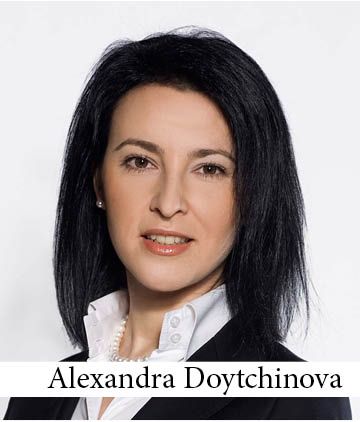 The discussion began with a consideration of the general state of the Bulgarian economy, and there was general agreement that, while the outlook was perhaps “just a little bit” better than the year before (in the words of both Penev Partner Christopher Christov and Schoenherr Managing Partner Alexandra Doytchinova) absolute confidence was premature. Christov suggested that “it’s a joyride, it’s up and down, up and down. Being in the Balkans and having the political situation changing – not dramatically, but significantly from time to time, affects the market and affect the economy, and the legal market is no different. Sometimes we are full with projects. Lately they are not that much.”
The discussion began with a consideration of the general state of the Bulgarian economy, and there was general agreement that, while the outlook was perhaps “just a little bit” better than the year before (in the words of both Penev Partner Christopher Christov and Schoenherr Managing Partner Alexandra Doytchinova) absolute confidence was premature. Christov suggested that “it’s a joyride, it’s up and down, up and down. Being in the Balkans and having the political situation changing – not dramatically, but significantly from time to time, affects the market and affect the economy, and the legal market is no different. Sometimes we are full with projects. Lately they are not that much.”
Reneta Petkova, Managing Partner at Deloitte Legal in Sofia, was slightly more optimistic: “I would say that definitely 2015 was better than 2014, because in 2014 we saw a lot of exits – only exits – of foreign investors from Bulgaria. In 2015, mainly because of huge absorption of EU funds and a little bit of development of export-oriented businesses, I think there was development in the economy. And we also saw the return of some of the foreign investors.”
Schoenherr’s Doytchinova noted that the global crisis didn’t really hit home in Bulgaria until about 2012, but that the years since have been hard. Like Petkova, Doytchinova reported seeing a trickle of foreign investors coming into the country in the second half of last year. “Unfortunately,” she said, “it’s too early to tell if this will stay, or if it’s a wave, or if it’s a general development. Let’s talk in six months’ time or nine months’ time, and then we can see.” Ultimately, she said, “Bulgaria will need some time to regain trust from foreign investors. Our politicians have managed to mess a lot up over the past years. A lot.”
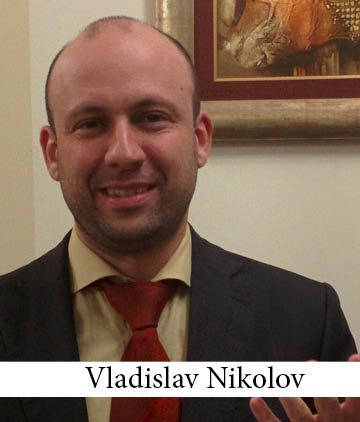
Vladislav Nikolov, the General Counsel of Overgas, referred to the lingering affects of the global crisis. “After 2012 the environment – in particular in the energy sector – has gotten worse. We’ve seen bankruptcies among the biggest consumers, and some big investors have left the country. Many went to Romania, which is strange at first glance, because our tax legislation here is twice as good as theirs. However, to many, Romania is the better place for business – and in the field of energy, this is definitely the case.” He concluded, smiling, “still, I tend to be optimistic.”
The host of the event, Penev’s Christopher Christov, pointed out that not all was bleak. “We have the IT industry here because we have the fifth fastest internet in the EU and the tenth fastest world-wide. Plus, the cost of electricity, this makes Bulgaria good for the IT sector. So this is a positive sign and a good example.”
A Stable and Diverse Bulgarian Legal Market
The participants at the Round Table spoke as one in describing the current legal market as fairly stable, with few significant split-offs (beyond Kinstellar, which took a team from Wolf Theiss to open its Sofia office in the fall of 2014), consolidations, or departures (since the departure of DLA Piper at the end of 2010).
Unlike in neighboring Romania, where the market is dominated primarily by domestic firms, in Bulgaria it appears that neither the internationals nor the domestics have the upper hand. Schoenherr’s Doytchinova said, “I think it’s a mix. We have very strong local law firms. I wouldn’t necessarily separate, because the domestic firms have the advantage of longer time on the market, while we [the international firms] have the advantage of the network. Everyone has a separate advantage. But I believe it is very much mixed on our market.”
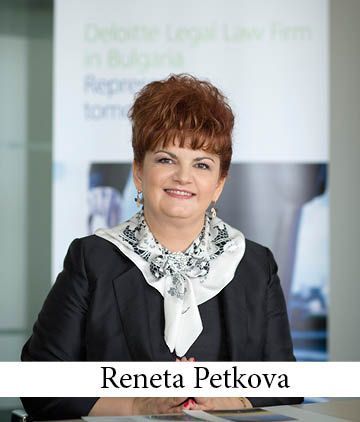
Deloitte Legal’s Petkova agreed, but reported that she’s seeing fresh law school graduates starting to lean towards the internationals: “I have interviewed a number of young people, and they have shared their experience, and they do prefer international firms. Mainly because they believe in international firms they will get more training.”
Doytchinova wasn’t convinced. “On the other hand, I’ve heard that senior associates at the domestic law firms have better prospects of equity partnership.” (Christov, who in January of 2015 was promoted to Partner at Bulgaria’s Penev firm, laughed. “Look at me as an example!”).
Stable it is … but vibrant it is not. Due presumably to the dullness of the Bulgarian economy in recent years, few firms are growing. Doytchinova reported that, at Schoenherr, “we are quite stable in size for the past two years. We have been rather replacing, but not necessarily growing much.” And Ivan Markov, Senior Partner at Penkov-Markov, said his firm is in a similar situation: “No one has left, and no one has come.”
The only exception was Petkova, who joined Deloitte as part of its reinvigoration of its legal practice across CEE. “We are definitely growing,” she said, “but we are a different case. I joined Deloitte Legal a year ago, and the size of our team has almost doubled since I arrived.”
The Rise of “Funeral Work”
Needless to say, the financial crisis has changed the kind of work available to lawyers in Bulgaria. Ivan Markov explained: “We are fully dependent on the development of the economy in the market. There is a proverb that lawyers will always survive irrespective of the crisis and the scope of work, and this is true … but the type and scope of the work have changed. In the past, when the economy was growing, the work was creative, productive, and a lot of mergers and acquisitions have been assisted by us – and this is something that we are all proud of. Then, along with the crisis, especially our law firm, we are experiencing a new type of work, which we call ‘Funeral Work.’ Insolvencies, bankruptcies, liquidation proceedings. These are things that, believe me, we are uncomfortable with, but we do.”
The subject turned to specific practices. Markov explained that he does not believe that Real Estate, for instance, will ever really return to what it was before the crisis, and he reported that, at the moment, it is only “slightly” active.
Petkova was a little – but only a little – more hopeful. “There are projects that have to be developed somehow. They were frozen before, and now either the financing banks or the owners want to do something with them. So I would say in residential, but also in the office space, there is slight development, but it is slow in all sectors.”
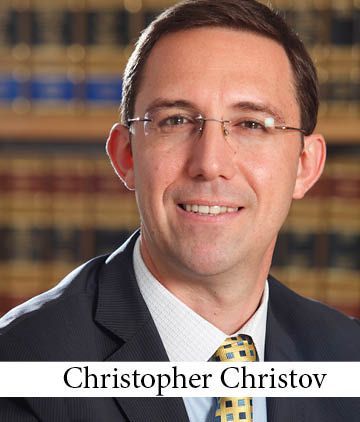
Christov, who started his career as a real estate lawyer, said that “now we have very speculative transactions, venture capitalists, and now the current state of the real estate market is like the opposite side of the restructuring. We had M&As – and now we have restructurings. In real estate we had large investments, and now we have ‘OK, we have to figure that out and just not foreclose it.’ So it’s this kind of work.”
When asked about the amount of Energy work available to law firms in the market, there was a pause. Christov said, “we are away from the honeymoon period. Now there is a lot of work – not immense – but the money is there.” He then said, “Well, it is a strong practice, but it’s a controversial practice. There are retroactive changes within the laws for accessing the grid and feed-in-tariffs, and this changes the business model of the investors in energy, so this changes the legal work. Instead of doing corporate stuff, and expansion, they try to squeeze and seek even – if not negative events – exit.”
Vladislav Nikolov described his frustration at what he feels is the Bulgarian government’s improper support for state-run entities: “I think the explanation is in the lack of political will for liberalizing the energy market. The governments are fighting to keep the status quo, i.e., to secure the status of state-owned companies as the key players on the energy market. Private investors entering the market need to compete with Bulgargaz and NEK, for example. And it turns out to be impossible.”
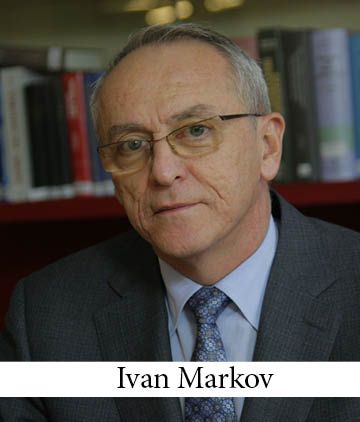
Ivan Markov explained that his firm sees a lot of disputes against the regulatory authorities in the energy sphere. “we do pursue administrative cases against the regulator in this respect. Because a lot of investors were attracted initially into the very promising incentives that the government initially launched. Then step by step they start to cut, to cut.”
For that reason, among others, dispute practices are constituting an increasingly valuable source of revenue at major Bulgarian firms. Markov said that, at his firm, “this is the biggest group. We started fifteen years ago with less than 3%. Now we are almost 20%.”
Christov said, “We are more on the corporate side, like Schoenherr, but still we have the litigation team, and we try to settle more and more out of court just to have some results, otherwise it just drags on and on for ages.”
Markov wished him luck, saying that while “it was possible years ago … now it’s by far less possible. Somehow the disputing participants have also changed their approach. Sometimes they like to go into court just to create damage. Just to make noise.”
Petkova nodded her head. “Yes, I have to agree with this. I registered as a mediator several years ago, and I have not practiced true mediation once, yet. Of course I use my knowledge and mediation skills, but otherwise, I do agree that, absolutely. It was in the past as well, the businessmen like from time to time to fight, they don’t realize it’s against their interest.”
Fees and Fee Caps
The subject of fees brought frowns and sighs, as Christopher Christov said there was “definitely” a trend downwards on fees. Doytchinova nodded. “I fully agree that fees are going down over time. I wouldn’t say that they have changed for the past one, one and a half years, but compared to 2010 there is certainly a change, and not an insignificant one.”
The participants at the Round Table shared outrage at the increasing – and, they agreed, unreasonable and uninformed – demand for fee caps. According to Ivan Markov: “The approach has changed. Have you received a request to send an offer to assess three or four hospitals, and maybe some other buildings, and you have to deliver it for an acquisition, and the fee has to be fixed. What is this!? This is something I can not understand, and this is only for the legal profession. We are offering a fee for a due diligence report, without knowing one line of what’s involved. Completely blindly. Of course we are pressed by the expectations of the client, and the competition. We are trying to be cost efficient as much as possible, but it sometimes goes against us.”
Doytchinova nodded emphatically. “The problem is really in the behavior. Lower hourly rates are not the problem. The problem is these requirements for caps that are fully unreasonable. So you have a client who only insists on a cap without being able to explain what you have to deliver for that cap. We have seen horrible examples where someone is looking – a big international company with a Bulgarian team – and they are looking for monthly advice and they want a fee cap. But they are not able to explain what the matter involves. Is it litigation, is it employment? How many hours have you worked until now? It makes a difference if it’s 20 a month or 200! And they say, ‘No no! We want a cap!’ That’s unfortunately a rather bad discipline and a lack of understanding.”
Markov shook his head. “It’s awful. It’s awful.”
Reneta Petkova added her perspective as well. “There are limits, you know? Definitely we all here keep our reputations. We cannot deliver the work for peanuts. We cannot manage the quality under those conditions. I fully agree this is not, any more, an hourly-rate market. Absolutely no such quotes for hourly rates. Only capped or fixed fees. And without a strictly defined scope. So you have to be a magician to put assumptions in order just to make sure you won’t have to write off 100% of your time. And to provide regular fee updates and assure predictability for the clients, at the same time.”
Doytchinova explained another aspect of the problem. “And because of the loyal clients you can’t go endlessly down. You can’t offer something new to someone new on the market and disadvantage your long-term clients.”
Markov agreed. “Yes. The ‘old loyal’ clients suffer the most from this. Because they’re placed in the most inadequate position compared to the new clients. So we have old clients, 25 years already with us, at a level that is 50% higher – more beneficial to us – than the newer clients. What is that?!”
And the perhaps-inevitable result is that some firms may be choosing to focus more, or first, on those clients who pay more. Doytchinova claimed, “You know, I have heard rumors – of course I have no idea if they’re true – that some firms in the market are prioritizing work by looking at the fees. So as a client, you pay less, you don’t have priority. Which, if this is true, is unacceptable.”
Petkova said she has heard similar rumors: “Or they push the work down, to juniors, who can not deliver good quality service. But the clients don’t understand this.”
Doytchinova concluded with a sigh. “They don’t see the difference. Until they see.”
Biggest Challenges Going Forward
Finally, the conversation turned to what was agreed to be among largest challenges facing the legal industry and the market in general: the lack of predictability in the Bulgarian courts.
Ivan Markov clarified: “This is not a challenge. This is a pain.”
When asked whether the lack of predictability is a function primarily of incompetence or Bulgaria’s ongoing struggles with corruption, Doytchinova said, “I think it’s a mixture of both, because we see incredibly incompetent decisions. We don’t know if they have been influenced, or what.”
Vladislav Nikolov, of Overgas, echoed the others at the table. “I agree with my colleagues. Business needs stability and predictability. Effective judicial reform will be a big step forward in removing the uncertainty which business is facing now.”
Reneta Petkova cited the same three obstacles. “For me as well, predictability, corruption, and judicial reform, and I would add two more things. We mentioned already the fee pressure, and … the technology that will change our profession. And both of them can change our profession in ways we don’t want, making it more commoditized. I do feel that our profession is a creative profession and we shouldn’t have our services as a commodity.”
With that the Round Table came to a close. We’d like to thank the Penev Law Firm for hosting the event.
*Photo of Reneta Petkova by Yulian Donov, Manager Magazine
This article was originally published in Issue 3.1 of the CEE Legal Matters Magazine. If you would like to receive a hard copy of the magazine, you can subscribe here.









